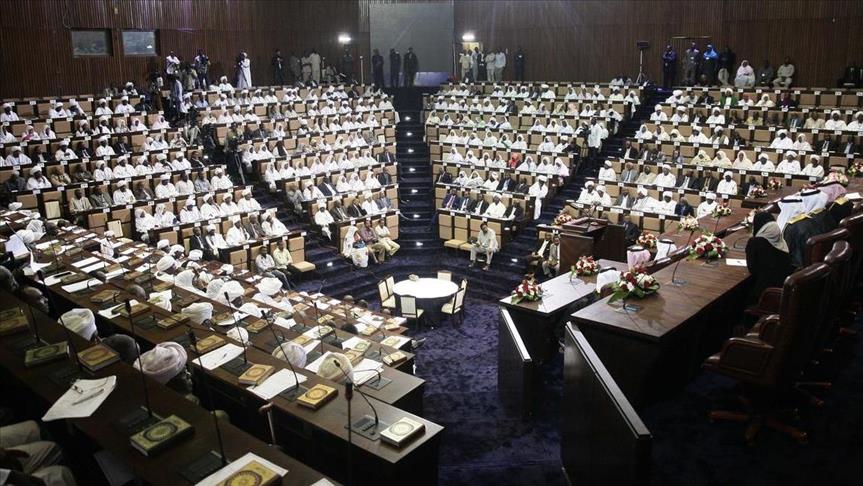الممارسة العملية للرقابة البرلمانية لأداء الحكومات الوطنية المتعاقبة (دراسة حالة السودان ما بعد الاستقلال في العام 1956م)
The practical exercise of parliamentary oversight of the performance of successive national governments-A case study of Sudan after in 1956

اعداد : د.علي ميرغني أحمد علي، كلية القانون، جامعة النيل الأبيض، كوستي، السودان
- المركز الديمقراطي العربي –
-
مجلة العلوم السياسية والقانون : العدد الثاني والثلاثون حزيران – يونيو 2022 – المجلد6 – وهي مجلة دولية محكمة تصدر عن #المركز_الديمقراطي_العربي المانيا- برلين.
- تُعنى المجلة في الدراسات والبحوث والأوراق البحثية عمومًا في مجالات العلوم السياسية والعلاقات الدولية،والقانون والسياسات المقارنة، والنظم المؤسسية الوطنية أو الإقليمية والدولية.
Journal of Political Science and Law
للأطلاع على البحث من خلال الرابط المرفق :
الملخص:
تناول البحث موضوع الممارسة العملية للرقابة البرلمانية لاداء الحكومات الوطنية المتعاقبة، دراسة حالة السودان ما بعد الاستقلال في العام 1956، حيث تكمن مشكلة البحث في الدور المتعاظم الذي لعبته الرقابة البرلمانية كأداة استثنائية إلا أنها بالرغم من ذلك لمى تجد حظها من الدراسة والتمحيص، وحسب علمي المتواضع لاتوجد أي دراسات متكاملة حول التجربة السودانية المتميزة في هذا المجال، هذا من الناحية الموضوعية، وهنالك عامل ذاتي أخر شجعني أكثر على اختيار هذا الموضوع لأنني اعتبر نفسي شاهدا مباشرا على هذه التجربة، لأكثر من عشرين عاماً، قضيتها في العمل العام، وقع اختياري للموضوع (الرقابة البرلمانية) لعدة اسباب ورغم تفاوت هذه الأسباب في أهميتها، إلا أنها تضافرت جميعها لتجعل من الموضوع مادة مثيرة لاهتمامي، وكذلك الدور المؤثر الذي لعبته كأداة فعالة جداً في رقابة أداة الحكومة.
يهدف البحث لتوضيح مدلول ومغزي الرقابة البرلمانية، ودراسة الاوامر المؤقتة وتناولها من ناحية نظام قانوني وموقف الدساتير المختلفة، وقد استخدمت المنهج التاريخي الوثائقي، وكذلك المنهج الاستقرائي التحليلي، وأهم النتائج أن هناك مجموعة من المبادئ والقيم تم التعبير عنها في قوالب مختلفة منها مبدأ المشروعية والسيادة الشعبية ونظرية الفصل بين السلطات، والحيلولة دون تركيز السلطة في أيدي قليلة، وضمان الخضوع الكامل للقانون من قبل الحكام والمحكومين، وتكريس النهج الديقراطي في اتخاذ القرار، ووجود المعارضة القوية البناءة داخل المؤسسة التشريعية أو من خارجها يمثل عنصر ضبط ورقابة لا يستهان به، وأهم التوصيات أنه لا يصدر التشريع الاستثنائي إلا في غياب البرلمان، وعند نشوء ظرف داخلي طارئ ومستعجل، الامر الذي يشترط تضرر المصلحة العامة تضرراً بالغاً اذا لم يصدر التشريع بالسرعة المطلوبة.
Abstract
The research dealt with the subject of the practical practice of parliamentary oversight for the performance of successive national g1overnments, a case study of the post-independence Sudan in 1956, where the research problem lies in the growing role played by parliamentary oversight as an exceptional tool. There are no integrated studies on the distinguished Sudanese experience in this field, this is from an objective point of view, and there is another subjective factor that encouraged me more to choose this topic because I consider myself a direct witness to this experience, for more than twenty years, which I spent in public work, I chose the topic ( Parliamentary oversight) for several reasons, and despite these reasons varying in importance, they all combined to make the subject matter of interest to me, as well as the influential role it played as a very effective tool in oversight of the government’s tool.
The research aims to clarify the significance and significance of parliamentary oversight, study temporary orders and address them in terms of a legal system and the position of different constitutions. I have used the historical documentary method, as well as the inductive analytical method. The most important results are that there are a set of principles and values that were expressed in different templates, including the principle of legitimacy and popular sovereignty. The theory of the separation of powers, preventing the concentration of power in a few hands, ensuring complete submission to the law by rulers and the ruled, consecrating a democratic approach to decision-making, and the presence of strong constructive opposition within or outside the legislative institution represents a significant control and oversight element, and the most important recommendations are that it should not be issued Exceptional legislation, except in the absence of Parliament, and when an urgent and urgent internal circumstance arises, which requires that the public interest be severely affected if the legislation is not issued with the required speed.




